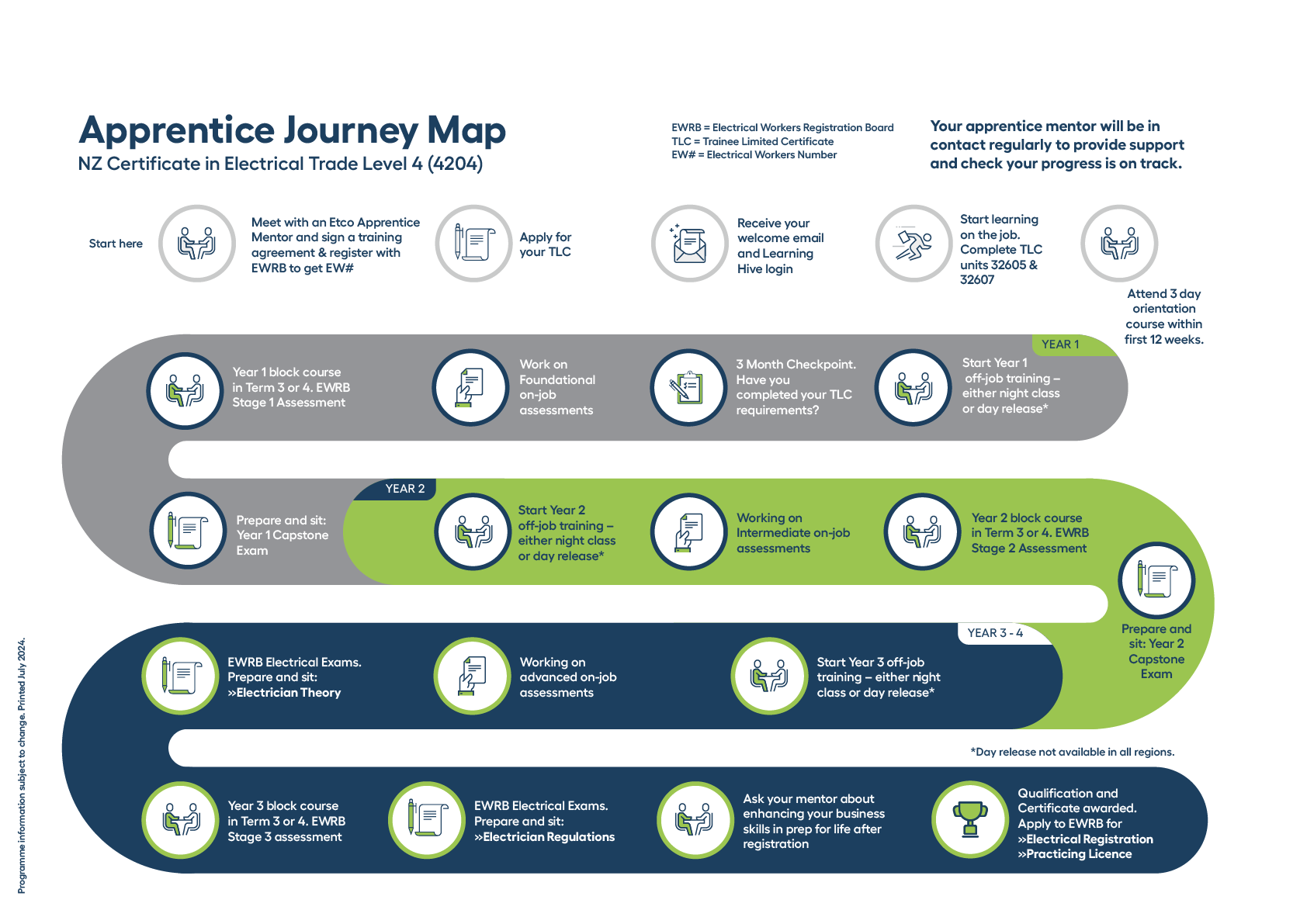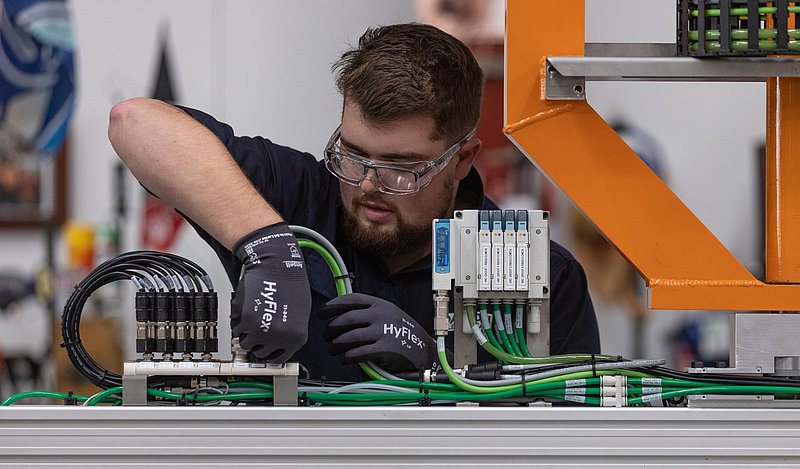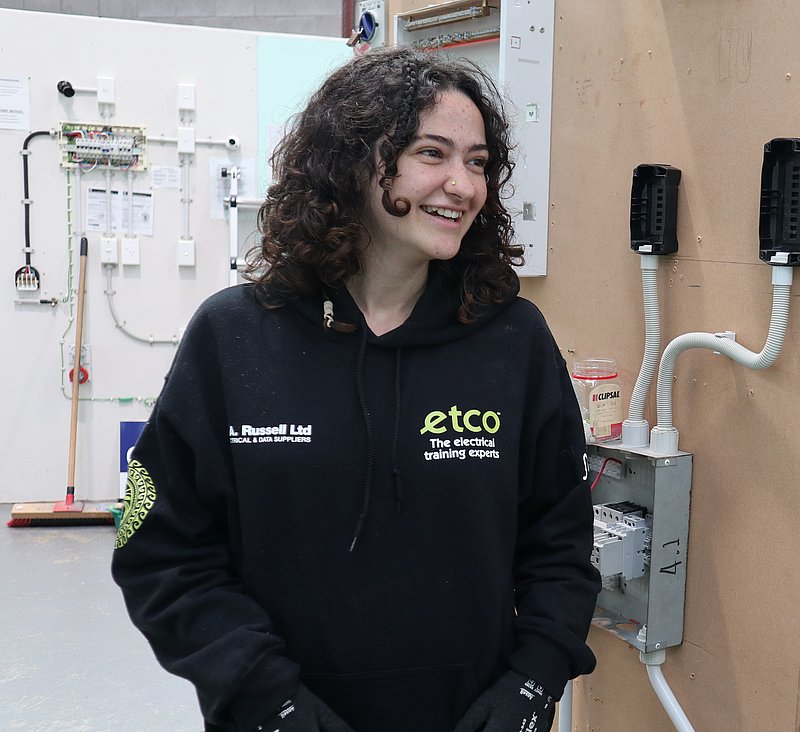An apprenticeship with Etco takes you places
How to become an apprentice
Welcome to your electrical engineering career! An apprenticeship is not a destination; it is a gateway to a range of exciting opportunities in a fast-evolving industry.
You will be enrolling in the new, New Zealand Certificate in Electrical Engineering Trade (Level 4).
Apprentice electricians starting today will eventually work with exciting new technologies that haven’t even been invented yet.
As a qualified electrician, you will be keeping the economy moving because nothing happens without electricity. Electricians commission and maintain electrical systems in homes, commercial buildings, factories, processing plants, and in a range of growth sectors of agriculture, marine and aerospace industries.
There are a wide range of opportunities for you when you complete your apprenticeship including owning your own business or specialising in particular areas – the sky is the limit.
Etco can help you get into an apprenticeship in two ways:
- You can apply for employment with us as an Etco apprentice and we will support you in all aspects of your apprenticeship and your personal journey.
- We can help you find employment as an apprentice with an independent employer. If you choose this path, you can still come to Etco for your night classes and block course training, and we will visit you and support your on-job learning.


About the qualification
Our Level 4 Electrical Trade Certificate is more than a qualification; it’s a benchmark for excellence in electrical trade education, designed with the input of those who know the industry best. Our apprentices are not just learning to become sparkies; they are training to become industry leaders ready to tackles the challenges of today and tomorrow.
Entry requirements:
- Level 2 NCEA or equivalent. If you don’t have the Level 2 subjects, we may be able to help you get there, or you can start your journey with our Pre-Trade Foundation NZCEE (L3) course.

Career pathways
There are many career options after you finish an electrical apprenticeship. Here’s a taste of what direction your career could go in.
Engineering: Electricians have a head start in the field of engineering, where they design and implement the electrical wiring of projects.
Solar and Wind Energy Specialists: Alternative energy is in higher demand both commercially and domestically.
Inspectors: Simply put, inspectors check the work done by electricians. People often choose to train in inspection when considering foreman and management roles.
PLC / HMI: Electricians with a knack for development often choose further training in PLC Programming and HMI integration. This technology automates a huge variety of operations in all sectors.
Automated tracking systems / IoT: Part of the magic of automation is the work of the electrician.
EVs: Electric vehicles are here to stay! Specialising in EV technology now involves installing charging stations to keep up with demand, and more fascinating innovation is in development.
Project Management: Like to take control of the big picture? You could be supplying energy to housing estates, businesses and urban infrastructure, or working on renewable energy projects such as solar, wind or wave farms, or gas plants.
Marine Electricians: A marine electrician installs and takes care of electrical equipment and systems on board ships, boats and maybe the odd super yacht. They often handle emergency repairs on ships in port, in dry dock, and out at sea – a nice option if you like the outdoors!
Line Mechanic: There are several essential line mechanic roles needed in the industry. Work involves installing and maintaining low or high voltage power lines, joining cables, repairing distribution networks and more.
Estimator: Electricians (not just engineers) make great electrical estimators because they can analyse blueprints to determine the electrical needs of a project and provide solutions for keeping the project on time and on budget.
Business Ownership: Joining an established electrical business can pay dividends down the line. If you can prove you’re a valuable worker, you may end up as a shareholder. Other sparkies set up their own business too, taking on courses and classes to upskill.
Teaching and Tutoring: Educating the next generation of electricians is crucial to keeping the industry humming. Teaching can be very flexible and is especially rewarding for those that love to share knowledge and success.
Electrical Suppliers: With the knowledge and hands-on expertise, apprentice graduates make excellent employees for electrical suppliers. Roles may include Technical Sales Representatives, Purchasing Officers and Branch Managers.

Fees
New Zealand Apprenticeship in Electrical Trade (General Electrical Strand) Level 4
From 2025, the Fees Free scheme changes to cover only the final two years of an apprenticeship.
Fees Free Changes
From 6 October 2025, all final-year Fees Free information and support has moved to Inland Revenue. If you’re looking for information about Fees Free eligibility, applications, or have questions about this government funding, please visit ird.govt.nz/fees-free where you’ll find the most current details and support.
Applications for final-year Fees Free will open through myIR from 15 January 2026.
For more information go to our Fees Free Policy information page.
Fees Information
- Etco Employed Apprentices: Etco will cover the cost of all training.
- Directly Employed Apprentices Training with Etco:
If you are not eligible for Fees Free, you are required to pay $59.00 per week, which is by direct debit.
Please note: Etco strives to ensure that the information provided on this website is up-to-date and accurate. Please note the information provided, including information on fees and courses, is regularly reviewed, and no warranty or representation is given about the ongoing accuracy of such information. All fees may change without notice. Etco does not accept liability for any damage or losses that occur directly or indirectly from you relying on the information on this website.